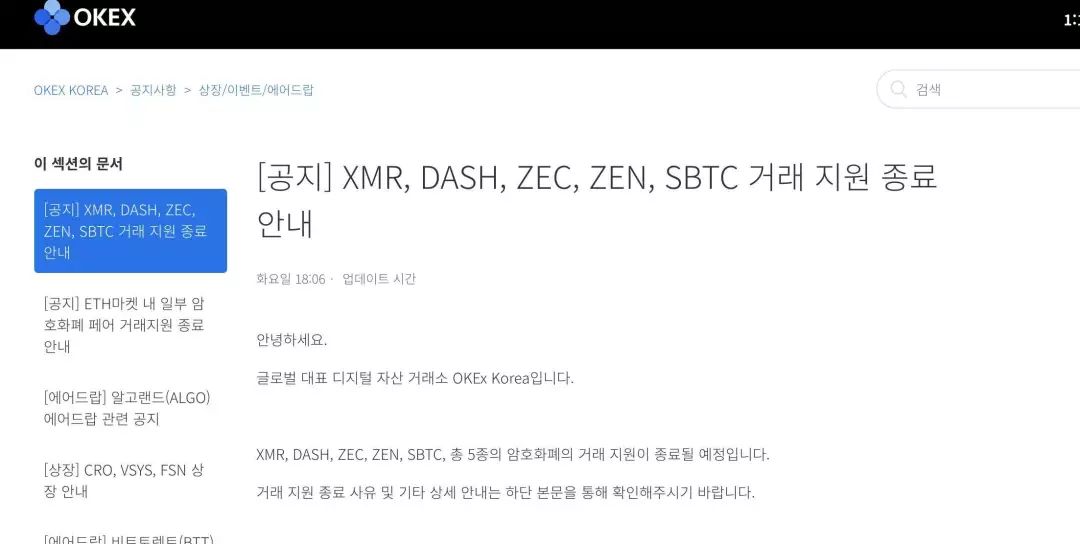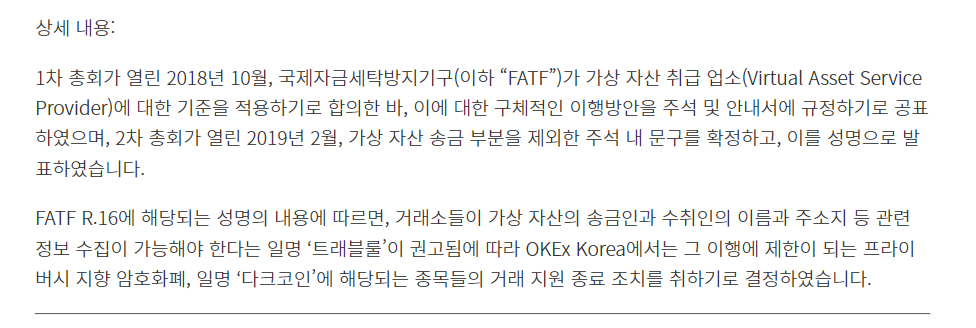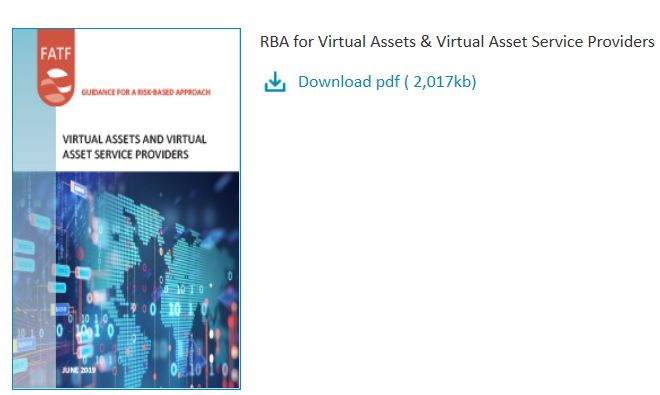Anonymous coin "dead" countdown, where should privacy go?
On the 16th, OKEx Korea announced that it will release five kinds of anonymous coins on October 10, including Monroe (XMR), Dash, and ZEC.

According to the announcement, the main reason for the removal of anonymous coins is that these anonymous coins violate the new FATF regulations. According to the FATF R.16 statement, the exchange must collect the names and addresses of the senders and payees of the virtual assets. Information, so OKEx Korea decided to remove items such as anonymous coins that set restrictions on personal privacy.

- The volume and price match is not ideal, and the rotation type is not far behind.
- Digital currency promotes financial innovation, and which areas will benefit?
- The market oscillated and washed the car, ETH continued to lead the test for $200
FATF's strongest regulatory act
On June 22, a new regulation called the strongest regulation of digital currency was officially released. The final version of the FATF's anti-money laundering and terrorism financing regulatory guidelines clearly requires that virtual currency service providers (VASPs), including cryptocurrency exchanges, must pass information about customers to law enforcement when it comes to fund transfers.

It is understood that the customer information includes: the sender's name, the originator's account number used to process the transaction, the sender's actual (geographic) address, the ID card or customer identification number (non-transaction number), date of birth, and location, etc. Recipient's name and information, recipient account number.
In addition, the guide also stipulates that the following five pieces of information must be included in each cryptocurrency transaction:
1. The name of the sender of the transaction (such as the sending customer).
2. The originator account used to process the transaction (eg virtual asset wallet).
3. The actual (geographic) address of the sender of the transaction, the resident identification number, or the customer identification number (ie, the non-transaction number) that uniquely identifies the originator of the ordering agency, date of birth and location.
4. The name of the beneficiary.
5. Beneficiary account number (such as virtual asset wallet) used to process the transaction.
According to the FATF, the threat of crime and terrorist misuse of virtual assets is “serious and urgent.” This guide gives countries 12 months to comply with the guidelines and will review them in June 2020.
For the time being, although it is still too early to review the 12-month review period, it is clear that South Korean regulators have begun to implement the FATF's regulatory guidelines. It is worth mentioning that, before, there is news that the G20 or The new FATF regulations will be adopted. This also means that not only South Korea, but other G20 member countries such as China, the United States, the United Kingdom, Germany, France, etc., are likely to perform similar operations on anonymous coins within 12 months.
Anonymous currency dilemma
In fact, the topic of “controlling monitoring and protecting privacy” has always been the main contradiction between government regulatory agencies and cyber liberals.
In the eyes of regulators, the anonymity of cryptocurrencies greatly increases the risk of money laundering, and it also provides a comfortable criminal cradle for criminals. For consumers, privacy is a public good, and they have the right to resist such monitoring, especially if they don't know it.
Earlier, US Treasury Secretary Steven T. Mnuchin publicly stated: "We do not allow cryptocurrencies to have a reciprocal relationship with secret number accounts; we will allow appropriate use, but we will not tolerate (cryptocurrency) continue to be used for illegal activities; In the United States, I (on behalf of the Treasury) have set up a working group with the Federal Reserve and other regulatory agencies to ensure that digital assets are used only for legitimate purposes; I encourage you to do the same in your own market.
In this case, the Anonymous currency became the main grounds for tug-of-war between the two sides.
In May last year, under the pressure of the Japan Financial Services Agency, the Japanese exchange Coincheck had confirmed the removal of several privacy coins.
At the same time, Korea's large exchange Korbit also announced that it will no longer support anonymous currency transactions such as Dash, Monroe, Big Coin, Augur and Steem.
In July of this year, a number of banks in South Korea implemented strict supervision on the accounts of cryptocurrency users, with the goal of completely abolishing anonymous cryptocurrency transactions in Korea.
In addition, on the 16th OKEx Korea station, many anonymous coins were removed. It can be seen that in this "cat and mouse game", with the increase of the firepower of the regulatory agencies, the anonymous currency has encountered an unprecedented dilemma.
Good or bad?
There is no doubt that global alliance-style regulation is enough to have a huge impact on the cryptocurrency industry.
For the FATF “new regulations”, some industry practitioners expressed their concerns. Previously, Bloomberg reported that they were concerned that in order to meet FATF's industry norm requirements, blockchain technology must be fundamentally reorganized or a complex parallel system built between exchanges.
There are even opinions that this may be one of the biggest threats facing the encryption industry.
Research director Messari Inc. of the encryption research institute said in an email that this depends to a large extent on how national regulators will interpret and apply rules that have long dealt with traditional bank wire transfers, but these rules are by far the largest encryption industry facing One of the threats, "the FATF's recommendations may be much greater than the impact of the US SEC or any other regulatory agency to date."
However, compared with some defamatory statements, it has also been said that the admission of supervision represents a great advantage.
Optimists believe that regulation brings legal certainty, legitimacy, trust and confidence to the market, and this will undoubtedly promote the adoption of digital assets.
Previously, Zhu Youping, deputy director of the China Internet Information Center, and block economist Zhu Youping said: "Regulatory will definitely have an impact on the international transfer of negative energy. A large part of cryptocurrencies such as Bitcoin is indeed a business in this area. But for the positive energy international transfer is good, the rules will play the role of good money to expel bad money. This is good for the standardization and sustainable development of the international money transfer business of encrypted digital currency." And Zhu Youping believes that the FATF wants to unite Supervision is good for the market.
From the market reaction point of view, when the FATF introduced new regulations, Bitcoin has risen from a minimum of 9,000 US dollars to a high of 13,000 US dollars. On the 16th, the market did not react too much to the exchange of anonymous coins. .
In short, the controversy over monitoring and privacy continues, and this is destined to be a long topic.
We will continue to update Blocking; if you have any questions or suggestions, please contact us!
Was this article helpful?
93 out of 132 found this helpful
Related articles
- Chief Economist of CITIC Securities Research: Implications for the People's Bank of Digital Currency
- Analysis | After 2028, bitcoin prices will never be less than $100,000
- Blockchain Weekly | Industry Weekly Financing 9, National Supervision Continues to Voice Libra
- Looking at the blockchain application from the Shanghai Blockchain International Week Demo Day
- France prevents Libra from doing business in Europe; Coinbase is expected to launch the IEO platform
- OTC market research: the “paradise” of money launderers?
- Another country announced that it will be on the blockchain legal digital currency, it will not be the last one






